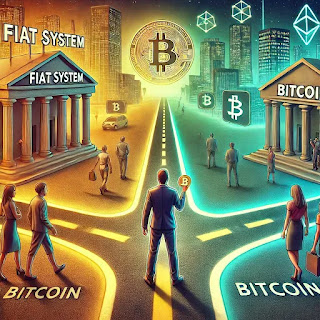The Hidden Cost of Convenience: Why Easy Money Makes Soft Minds
We live in an age where convenience is king. Groceries appear at our doors. Information flows into our pockets. Digital assistants finish our sentences before we do. But in this smooth and streamlined world, something vital is being lost—our edge.
Nowhere is this more evident than in the way we relate to money.
Modern finance, powered by fiat, has embraced the ethos of ease. Money is printed, debt is normalized, and stimulus is injected like a societal sedative. It’s a world built for comfort, but that comfort is rotting our minds.
The Sedation of Society Through Easy Money
Fiat money is like junk food for the soul: quick, satisfying, and deeply damaging over time. Central banks conjure trillions with a keystroke. Governments hand out checks to “stimulate” the economy. Credit cards give the illusion of wealth while chaining people to interest payments.
This system rewards consumption over creation, dependence over discipline. It removes friction from financial life, but also removes the need to think deeply, plan long-term, or exercise restraint. When effort becomes unnecessary, growth becomes optional.
Inflation: The Hidden Thief of Incentive
Inflation is often sold as a natural part of economic life, like weather. But it’s really a tool of theft, quietly extracting value from savers and funneling it to those closest to the money printer.
Why save, when tomorrow your money is worth less? Why delay gratification, when spending now feels safer? Inflation doesn’t just steal wealth, it steals willpower. It punishes discipline and rewards recklessness.
This isn't just bad economics. It's bad psychology. It breeds a culture of now, where comfort becomes the goal, and struggle becomes unthinkable.
Convenience Culture and Cognitive Decay
Zoom out from money and you’ll see the same rot in our habits. Fast food over cooking. Swiping over courtship. Bingeing over building. In a world optimized for instant gratification, our cognitive muscles atrophy.
We no longer have to solve problems, we just Google them. We no longer have to earn trust, we just perform it. As convenience rises, resilience falls. When life demands nothing of you, you forget what you're capable of.
Bitcoin as a Mental Weight Room
Enter Bitcoin. It doesn’t pander. It doesn’t bail you out. It doesn’t do easy.
Bitcoin is a protocol of truth, scarcity, and proof-of-work. To understand it, you must wrestle with economics, math, game theory, and human nature. To hold it, you must endure volatility and resist the herd. To benefit from it, you must think, critically, independently, and long-term.
Bitcoin doesn’t just store value. It restores it, first in the mind, then in the world.
The Character-Shaping Nature of Scarcity
Hard money creates hard people. Fiat breeds entitlement, Bitcoin demands effort. Fiat is fast food, Bitcoin is fasting.
Scarcity forges creativity. Constraint inspires innovation. Proof-of-work isn’t just a protocol, it’s a mindset. One that says: value must be earned. And in that earning, you grow.
Rebuilding Strength in the Age of Ease
We don’t need more ease, we need more meaning. We need to push back against the algorithmic lullaby of modern life. Bitcoin offers that resistance. It’s a path that requires mental muscle, patience, and conviction.
This is not just about money. It’s about choosing the struggle that makes you stronger.
Conclusion: Choose Your Struggle
Life offers two types of pain: the pain of discipline or the pain of regret.
Fiat offers comfort, but it’s a cage. Bitcoin offers challenge, but it leads to freedom. Your brain was built for effort, not autopilot.
Closing Line: Comfort is a cage when the cost is your mind.




Comments
Post a Comment